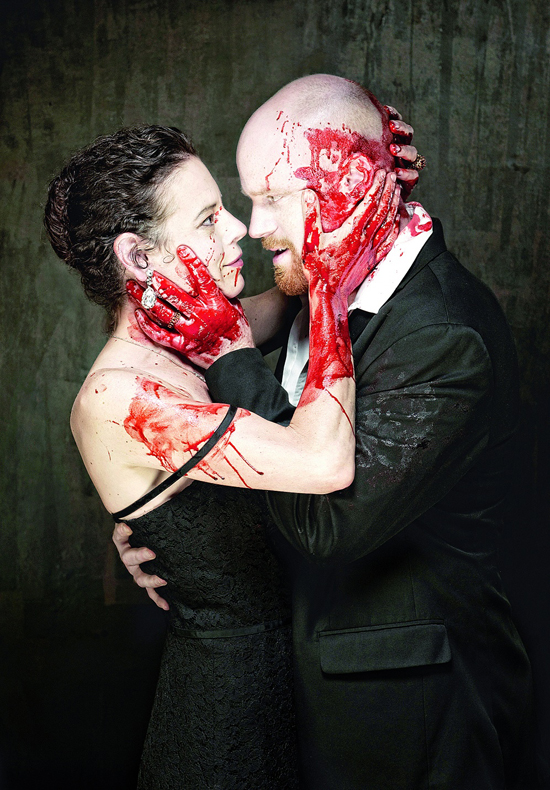
| ||||||
Superstition has it that uttering the name of William Shakespeare's swift, brutal play will unleash spells and supernatural disasters upon the speaker. Perhaps the Scottish King's three witches were on summer break, because this Inside Scoop event went off without a hitch.
Joel Sass, the visiting director, spoke first about sculpting the form of his adaptation. Intent on creating "a claustrophobic atmosphere," Sass chose "an asylum setting where I'm hanging the skin (of this play)." His hands clasped repeatedly, like a vice, as he described his vision. He's a mild-mannered gentleman from Minnesota-a "humorous genius," according to dramaturg Philippa Kelly- but one with smoldering undercurrents.
"There's a hallucinatory thing I like in theater," he said, "seeing a character reconstitute themselves adds deeper layers to a play already steeped in psychology." He enjoyed adapting the play for a small cast; making a point of referring to the reduction as "an opportunity" as opposed to "a challenge."
"Adaptation keeps a production alive," he said later, sensing the unspoken question: How can you improve upon a masterful play written by a master? "It's still Macbeth," he said, tempting fate to smite him and defending his right to put his mark on the play. "We keep the over-arching doomed rocket ship that is Macbeth's trajectory."
Moscone brought forward masks, not the final versions, but representations of the costume design. For Sass, the masks were a "trip wire," releasing him from the restrictions of a specific historical context. "With contemporary clothing, you focus on the relationships, not the reference to a place or time period," he said.
Traditionalist may find his design alterations bold, but Sass' most forward-thinking move may have been his approach to casting. While asking himself, Who drives the play? Who's essential to the play? Sass said he selected the actors without being sure which parts they would play. It's an inverted technique and a surprising twist in the directorial process.
Craig Marker, who will play Macduff and a variety of other characters, ("I'm the voice of an apparition, but not the body," he boasted,) talked of being an actor. "I think about how I will provide for my family, with a wife and a two-and-a-half year old daughter," he said. He offered his philosophy for auditions, which might well apply to his parenting technique: "You've got to treat it like it's your only chance to play the role for the people in the room."
Jumping to the production, his energy was focused. "There's a scene that most people sleep through, because it's two guys just talking and talking and talking. We're finding something in that that will be unlike anything you've seen before. There are scenes in this play that are electric."
Moscone, not one to remain aloof from proximal energy, leapt into the discussion. "How do the plays keep a grip on you when they dive into these ancient warring sections?" he asked. He's jazzed by the discovery of new territory within classic works and thrilled at its effect on audiences. "The plays start to vibrate as you imagine the other ways you've seen them," he said
Questions from the audience close out each session at the Orinda Library and often provide lively, provocative responses from the panel. Sass spoke with conviction about capturing Macbeth's humanity: "Without it, it's the comeuppance of a bad apple. With it, he's a man who has all the potential for good, but loses his ability to wait, to resist temptation." Marker mentioned fellow cast members, amongst them, Samantha Martin: "She just played a role in Annie, and now she's being killed in Macbeth." And Moscone, the master of ceremonies, expounded and expanded on the subject of context, subtext, and super-text. At 8:05 p.m. it was over, with no apparent curse cast.
Reach the reporter at:
Copyright
